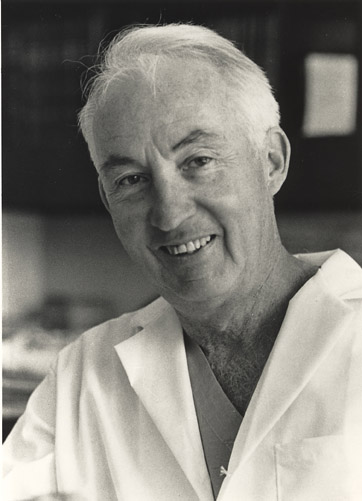Wasn't Norman Shumway the Dad in the TV Series, ALF?
Shumway conducted the first adult heart transplant in the United States in 1968. Building on his research at Stanford, Dr. Bruce Reitz performed the first successful heart–lung transplant on Mary Gohlke in 1981 at Stanford Hospital.Bruce
Some of the followinng info was in an article run in March 2016:
In 1980, no human lung transplant had survivedeitz (left) and Norman Shumway (right) perform the first successful heart-lung transplant in 1981 at Stanford Hospital, Stanford School of Medicine. more than 23 days. Anti-rejection drugs used up to that time didn't allow for wound healing. The U.S. Food and Drug Administration had approved a better antirejection drug, cyclosporin A, for heart-transplant patients, but not for other transplant patients. Stanford had asked the FDA to approve cyclosporin A for heart-lung transplant patients, too — and then waited and waited. Gohlke, increasingly desperate, asked her former boss, the executive editor of the Mesa Tribune, to help. He made calls to then-U.S. Sen. Dennis DeConcini, D-Arizona, and about an hour later the FDA approved the drug for use in heart-lung transplantation at all qualified hospitals. Gohlke received her new heart and lungs — becoming the first patient in the world to undergo a successful heart-lung transplant — and lived for five years with her new organs.
Long-term survival after heart-lung transplantation was first achieved in 1981 at Stanford and a total of 217 heart-lung transplantations had been performed by June 2008. This review summarizes Stanford's cumulative experience with heart-lung transplantation, demonstrates the progress that has been made, and discusses past and persistent problems. Diagnostic tools and treatment options for infectious diseases and rejection have changed and patient survival markedly improved over the almost three decades. Eight patients lived longer than 20 years. Further options to treat infections and strategies to control bronchiolitis obliterans syndrome, the main causes of early and long-term mortality, respectively, are required to achieve routine long-term survival.
STANFORD HEART DOCTORS
Heart and lung transplant surgeon
Clinical Assistant Professor, Card/Thor Surgery
300 Pasteur Drive
2nd Floor, Room A260
Stanford, CA 94305
Phone: 650-723-5468
Philip Oyer
Heart transplant surgeon
Roy B. Cohn-Theodore A. Falasco Professor in Cardiothoracic Surgery
Euan A. Ashley
Cardiologist
Associate
Professor of Medicine (Cardiovascular), of Genetics and, by courtesy, of
Pathology at the Stanford University Medical Center
300 Pasteur
Drive
2nd Floor,
Room A260
Stanford, CA
94305
Phone:
650-724-4942
*conducts
research on the health benefits of single malt Scotch whisky.
Kiran Kaur Khush, MD, MAS
Cardiologist
Associate Professor of Medicine (Cardiovascular Medicine) at the Stanford University Medical Center
300 Pasteur Drive
2nd Floor, Room A260
Stanford, CA 94305
Phone: 650-723-5468
Dr. Khush’s research focuses on the evaluation and selection of donors for heart transplantation; the pathogenesis of post-transplant complications, including acute rejection and cardiac allograft vasculopathy; and non-invasive diagnosis of post-transplant complications. She currently serves on the Donor Management Task Force—an ad hoc committee appointed by the US Department of Health.
Francois Haddad
Cardiologist
Clinical Assistant Professor, Medicine - Cardiovascular Medicine
300 Pasteur Drive
2nd Floor, Room A260
Stanford, CA 94305
Phone: 650-723-5468
54 5* SHC Patient Reviews, 2015--all sound like: Dr. Haddad is the best we could ever ask for - we love him!
Michael Pham, M.D., M.P.H. Cardiologist
Inquisitive person, 31 publications focused mainly on predictors (gene studies) and rejection/outcomes of heart transplantation.
Joseph Woo
Cardiothoracic surgeon
Norman E. Shumway Professor and Professor, by courtesy, of Bioengineering and of Surgery
300 Pasteur Drive
2nd Floor, Room A260
Stanford, CA 94305
Phone: 650-724-7500








